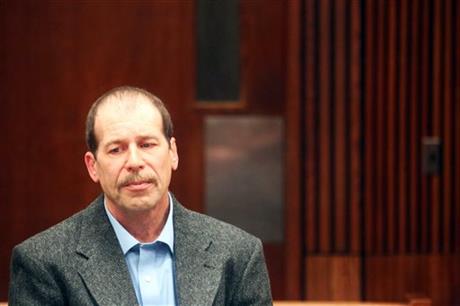Andrew Branca, a Massachusetts defense attorney who runs the Law of Self Defense blog, has been providing coverage as best he can (the judge forbid live streaming of the trial, so news has been coming out via Twitter) in his column over at Legal Insurrection.
Well, yesterday, the jury returned a verdict:
Theodore Wafer has been found guilty of Second Degree Murder/Voluntary Manslaughter and weapons charges
Defendant Theodore Wafer
(You can see the day-to-day coverage/commentary here, if you're interested, but it's quite a bit of reading.)The jury has returned a verdict of guilty of second degree murder/voluntary manslaughter and weapons charges in the trial of Detroit homeowner Theodore Wafer for the front porch shooting death of Renisha McBride in the early morning hours of November 2, 2013. Trial Judge Hathaway has ordered Wafer imprisoned immediately, pending sentencing.
There are a number of take-away lessons from this, but here are the big ones that stick in my mind:
- Obey the rules of gun safety. This should really go without saying, but Wafer's initial statements to the police indicated he had shot McBride by "accident." This damaged his claim of self-defense because self-defense is an inherently deliberate act. His defense team -- led by Cheryl Carpenter -- tried to portray the statement as the layman's use of the word "accident" (i.e. unintentional, reflexive) -- as opposed to the legal definition (e.g. unforeseeable, unpreventable) -- but if his finger hadn't been on the trigger, it's highly unlikely the gun would have "gone off" in the first place.
- Know the condition of your defensive firearms at all times. Related to the first (and yes, "all guns are loaded," and all that), if you're keeping firearms for self-defense, it would greatly benefit you to know for certain whether or not it's loaded, whether or not there's a round in the chamber, and whether any safeties are on or off. Another statement he made was that he didn't know there was a round in the chamber (he did know it was loaded), which further damaged his self-defense credibility.
- Don't open the door. Another weakness in his self-defense claim was that, when he heard McBride pounding on the locked screen door at ~4:30 a.m., he went to investigate, but made the mistake of opening the steel front door. Michigan law includes the front porch as part of the home for self-defense purposes, but if you're afraid for your life in the event of a home invasion, why would you open the door? Haven't we seen enough crime and horror movies to know that never ends well? (OK, that last was tongue-in-cheek, but still....)
- Don't talk to the police. At least, don't talk to the responding police until after you've had a chance to talk with your attorney. Be polite, cooperate, but don't make statements; they can and will be used against you -- just like the Miranda rights say, whether or not the police have read them to you -- so don't give them an opening. Just say, "I will cooperate, and I'm more than willing to provide a statement, but I'm still frazzled and I'd like to wait until I can calm down and consult with my attorney." They'll want an immediate statement, but there's no law compelling you to provide one. Better to wait until you've had a chance to process the events, to compose yourself, and to discuss with competent defense counsel what you should say.
 |
| Benjamin Franklin. Smart guy. (image source: Wikipedia) |
"By failing to prepare, you are preparing to fail." -- Benjamin FranklinSo, what will you do?

Professional training is essential. For example, the Massad Ayoob Group (MAG) 20 course is two intense days of nothing but preparing for, performing, and then surviving a self defense situation. All class room - no range. It's all a LOT more involved than you could know.
ReplyDeleteBest $400 I've ever spent.